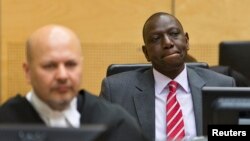The African Union (AU) is set to dispatch a high-powered delegation to the United Nations Security Council (UNSC) to plead with the UN to stop the International Criminal Court from prosecuting sitting African leaders.
The UNSC has the authority to do this under article 16 of the ICC's Rome Statute.
In a press release from the AU, the continental body said it had decided "to set up a contact group of the Executive Council to undertake consultations with the members of the United Nations Security Council, in particular, its five permanent members, with a view to engaging with the UNSC on all concerns of the AU on its relationship with the ICC, including the deferral of the Kenyan and Sudanese cases, in order to obtain their feedback."
They are also appealing to the UN to also defer the trial of Kenyan President Uhuru Kenyatta and his deputy, William Ruto.
Kenyatta and Ruto face charges of crimes against humanity following violence which gripped the country soon after the country held elections in 2007.
Hundreds of people were killed in the violence.
African Union diplomats confirmed to VOA Studio 7 that a high level delegation will be dispatched to New York in a few days.
United Nations diplomats said the AU request is not likely to be adopted as the Security Council is divided over this issue. This is despite reports in the British Telegraph newspaper that Western leaders have reached a deal to have the UN Security Council defer Kenyatta's trial by a year.
President Kenyatta's trial starts in November and he has twice before asked the court unsuccessfully to allow him not to be physically present at all the hearings in the Hague to allow him to continue with constitutional duties during the trial.
But Ruto told reporters in Nairobi on Tuesday that he will cooperate with the ICC.
Zimbabwean President Robert Mugabe has urged Kenyatta and Ruto not to cooperate with the ICC at the just ended AU summit in Addis Ababa.
Zanu-PF member and lawyer, Munyaradzi Paul Mangwana, said he supports Mr. Mugabe’s stance as the AU is being used by the West to target African leaders.
The International Criminal Court was established in 2002 with the objective of ending impunity for the worst crimes known to humankind: crimes against humanity war crimes and genocide. 139 countries have signed the ICC treaty and 122 have so far ratified it.
The ICC is so far investigating seven African countries namely Democratic Republic of Congo, Central African Republic, Ivory Coast, Kenya, Libya, Sudan and Uganda.
But the Coalition for the International Criminal Court says it must be highlighted that, the ICC is "undertaking preliminary examinations in Colombia, Afghanistan, Georgia, Hondurus, Guinea, Nigeria and the Republic of Korea and is analyzing whether it has jurisdiction over the Palestine territories."
The UNSC has the authority to do this under article 16 of the ICC's Rome Statute.
In a press release from the AU, the continental body said it had decided "to set up a contact group of the Executive Council to undertake consultations with the members of the United Nations Security Council, in particular, its five permanent members, with a view to engaging with the UNSC on all concerns of the AU on its relationship with the ICC, including the deferral of the Kenyan and Sudanese cases, in order to obtain their feedback."
They are also appealing to the UN to also defer the trial of Kenyan President Uhuru Kenyatta and his deputy, William Ruto.
Kenyatta and Ruto face charges of crimes against humanity following violence which gripped the country soon after the country held elections in 2007.
Hundreds of people were killed in the violence.
African Union diplomats confirmed to VOA Studio 7 that a high level delegation will be dispatched to New York in a few days.
United Nations diplomats said the AU request is not likely to be adopted as the Security Council is divided over this issue. This is despite reports in the British Telegraph newspaper that Western leaders have reached a deal to have the UN Security Council defer Kenyatta's trial by a year.
President Kenyatta's trial starts in November and he has twice before asked the court unsuccessfully to allow him not to be physically present at all the hearings in the Hague to allow him to continue with constitutional duties during the trial.
But Ruto told reporters in Nairobi on Tuesday that he will cooperate with the ICC.
Zimbabwean President Robert Mugabe has urged Kenyatta and Ruto not to cooperate with the ICC at the just ended AU summit in Addis Ababa.
Zanu-PF member and lawyer, Munyaradzi Paul Mangwana, said he supports Mr. Mugabe’s stance as the AU is being used by the West to target African leaders.
The International Criminal Court was established in 2002 with the objective of ending impunity for the worst crimes known to humankind: crimes against humanity war crimes and genocide. 139 countries have signed the ICC treaty and 122 have so far ratified it.
The ICC is so far investigating seven African countries namely Democratic Republic of Congo, Central African Republic, Ivory Coast, Kenya, Libya, Sudan and Uganda.
But the Coalition for the International Criminal Court says it must be highlighted that, the ICC is "undertaking preliminary examinations in Colombia, Afghanistan, Georgia, Hondurus, Guinea, Nigeria and the Republic of Korea and is analyzing whether it has jurisdiction over the Palestine territories."




